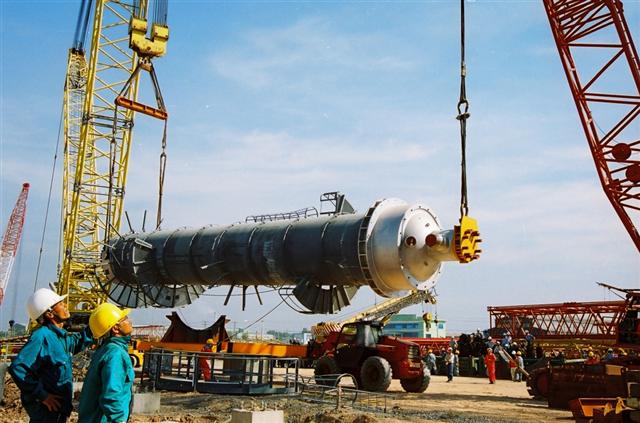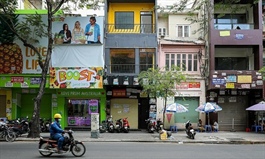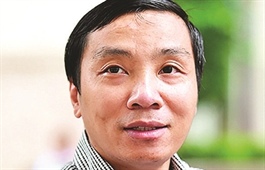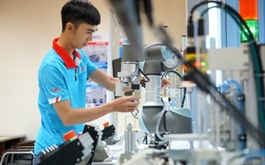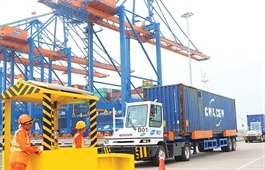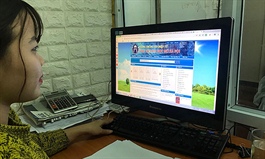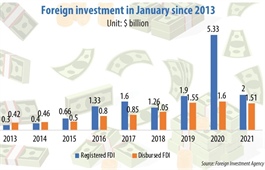Strategic focus for new decade: Sustainable business development
Strategic focus for new decade: Sustainable business development
Sustainable development has become an inevitable trend worldwide. All businesses need to acknowledge its importance and formulate proper long-term strategies for sustainable development if they are to succeed in the highly competitive market environment.
|
Mission for a new decade
The Vietnam Corporate Sustainability Forum 2020, themed “Sustainable development in the new decade: Turning challenges into opportunities”, took place in Hanoi on December 10, 2020.
The key issues discussed were lessons learnt from the Covid-19 pandemic as well as core issues that need to be addressed for inclusive and permanent socioeconomic growth in the decade 2021-2030. These include sustainable corporate governance, accelerating the circular economy and enhancing public-private partnership (PPP) for sustainable growth.
Addressing the forum, co-organized by the Vietnam Chamber of Commerce and Industry (VCCI) and the Vietnam Business Council for Sustainable Development (VBCSD), Heineken Vietnam presented the company’s best practice RESOLVE model (Regenerate, Share, Optimize, Loop, Virtualize, and Exchange). This is a circular economy framework using a holistic approach to create sustainable environmental value, such as reducing carbon emissions, protecting water resources, and utilizing all natural resources. Corporate Affairs Director at Heineken Vietnam Holly Bostock said the company has set ambitious targets to achieve zero waste and use 100 percent renewable energy by 2025.
In 2019, Heineken Vietnam’s circular economy model provided 212,000 jobs (directly and indirectly) and contributed 0.95 percent to Vietnam’s gross domestic product (GDP), through its value chain including VND5.7 trillion spent on local businesses by sourcing almost all of its packaging materials from local suppliers. In December 2020, Heineken Vietnam was honored as one of the two most sustainable companies in Vietnam (in manufacturing) at a CSI (Corporate Sustainability Index) ranking ceremony. This was the fifth consecutive year Heineken Vietnam received this top recognition for its continuous efforts in sustainability and positive impact on Vietnam’s socioeconomic development through its “Brewing a Better Vietnam” sustainability agenda.
Other businesses in Vietnam successfully applying the circular economy model for sustainable development include Unilever Vietnam, Coca-Cola Vietnam, and Netsle Vietnam, among others. Government leaders say that sustainable economic development is impossible in the absence of sustainable business community development, highlighting the need for business efficiency and social responsibility.
The government has made sustainable development of the Vietnamese business community a strategic focus. Vu Tien Loc, Chair of the Vietnam Chamber of Commerce and Industry (VCCI) said that in 2010-2020, VCCI made great efforts to realize party and state policies on sustainable business community development. In particular, VCCI launched the CSI and implemented annual corporate sustainability assessments, which have been welcomed by businesses and highly rated by the government.
In the next decade, the VCCI chair suggested that Vietnam focus on achieving three strategic breakthroughs: Continued quality improvement of socialist-oriented market economic mechanisms; development of human resources, science-technology, and innovation; and completion of modern and consistent socioeconomic infrastructure.
Capacity and responsibility improvement
VCCI is considering customization of CSI versions in accordance with the size of businesses.
According to Loc, CSI rankings will encourage enterprises, especially small and medium ones, to build sustainable development strategies, foresee risks and business opportunities and reach more efficient corporate governance.
In the context of the Covid-19 pandemic, businesses with CSI application did better than others in operation maintenance and development. Government policy on sustainable development of the private sector to 2025, with a vision to 2030, includes assessments of enterprises’ sustainable development and scaling up the CSI application.
Addressing the Vietnam Corporate Sustainability Forum 2020, Deputy Prime Minister Vu Duc Dam said that over the next decade, Vietnam would strive to fulfill the remaining two of 19 UN sustainable development goals. The country now ranks 88th out of 193 UN member states in this regard, having met 17 out of 19 criteria, he said.
Dam said that in 2016 when the CSI program was first implemented, Vietnam ranked 88th in the Corporate Sustainability Index, and in 2020, despite the increasingly difficult challenges, Vietnam climbed to 49th place thanks to joint efforts by the government and the Vietnamese business community.
The Deputy Prime Minister noted, however, that Vietnam is now home to 700,000 enterprises but not many are VBCSD members. Few enterprises have registered to implement the Corporate Sustainability Index, he said, urging campaigns to spread the values of sustainable development.
Economist Nguyen Dinh Cung, member of the Consulting Group of the National Council on Sustainable Development and Competitiveness Improvement, said that creating a sustainable business community requires the involvement of the entire political system, with major value chain leaders as pioneers.
| The VCCI and the VBCSD have issued numerous proposals to help improve the quality of socialist-oriented market economic mechanisms; fully develop human resources, science-technology, and innovation; and complete modern and consistent socioeconomic infrastructure, VCCI Chair Vu Tien Loc said. Accordingly, the government should improve policy support for micro-, small-, and medium-sized enterprises as well as startups, build policies to promote the circular economy, and improve the legal framework of the PPP investment model to match international practices and domestic realities alike, he said. |


